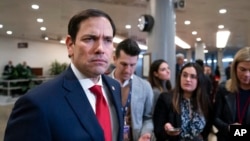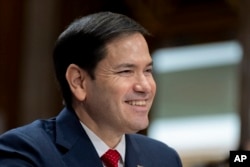Beijing’s lack of clarity about whether it will lift sanctions previously placed on Marco Rubio — the new U.S. secretary of state and a China hawk — has sparked speculation on Chinese social media about whether Rubio will become the first American diplomat in his position who can’t visit China.
On Baidu, China’s most popular search engine, sitting atop the trending chart Tuesday night was the question, “Will China remove sanctions on the new U.S. Secretary of State?”
On Weibo, China’s microblogging site similar to X, netizens wonder if Rubio will become the first U.S. secretary of state who won’t be able to come to China.
“This guy has been barred from entering China, let alone visiting China,” one Weibo user commented. “It’s now a question how he will be able to deal with China.”
Tough on China
Rubio, the first Cabinet member of the second Trump administration to be confirmed by the Senate, was sworn in Tuesday. He was one of the toughest congressional lawmakers on China during his 14-year tenure as a senator.
Rubio introduced bills, made statements and worked with rights groups that were highly critical of China’s human rights record and growing influence around the world. A Chinese state media article once called him “one of America's most radical anti-China politicians.”
In 2020, within a month, the Chinese government sanctioned Rubio twice.
The first was announced in July of that year as part of the retaliation against the U.S. government’s sanctions against a Chinese government department and four officials in Xinjiang for human rights violations alleged to have taken place in the region. The second one was announced in August after Washington sanctioned 11 Chinese and Hong Kong officials.
“I don’t want to be paranoid, but I am starting to think they don’t like me,” Rubio tweeted sarcastically back then after learning about the sanctions.
During his confirmation hearing last week, Rubio reaffirmed his position on China, asserting that China remains the “biggest threat” to the United States in the 21st century.
“If we don’t change course, we are going to live in the world where much of what matters to us on a daily basis from our security to our health will be dependent on whether the Chinese allow us to have it or not,” he said during the hearing.
On China’s heavily censored internet, most of the comments on his swearing-in have been negative.
In a proposed Cabinet lineup that includes candidates who are controversial, Rubio stands out as one with bipartisan support. He received a unanimous 99 confirmation votes.
Experts say that how Rubio approaches China will depend largely on President Donald Trump.
“Rubio has a long history of working on China. But everyone in the Cabinet is loyal to Trump. I do think Trump will be the ultimate decision maker on China,” Yun Sun, a senior fellow and co-director of the East Asia Program and director of the China Program at the Stimson Center, told VOA Mandarin.
“Any China policy will be a balance of issues to reach what Trump defines as American national interests. Hawkish views and friendly views will both be a part of the deal,” she said.
Necessary to 'maintain contact'
In his new role, Rubio has put Beijing in a peculiar position. The Chinese government has not publicly sent a clear signal regarding questions about whether it will lift sanctions on him to allow him to visit.
When asked if China would drop the sanctions, Guo Jiakun, a spokesperson for China’s foreign ministry, said Tuesday at the daily press conference, "China will firmly defend national interests. In the meantime, it's necessary for high-level Chinese and American officials to maintain contact in an appropriate way."
Recent online speculation about Rubio has evolved since social media users noticed the Chinese government ostensibly changed its translation of Rubio’s name.
Claims circulated that Beijing changed the translation so that it could lift sanctions on Rubio without looking embarrassed, because now China can say the sanctions were aimed at a different person than Rubio.
But the so-called new translation isn’t new at all. The first translation has been the most widely used for Rubio in Chinese government documents and media. However, as early as 2019, People’s Daily, Beijing’s flagship state media outlet and a mouthpiece of the Chinese Communist Party, used the second translation to refer to Rubio in an attack article.
Transcripts from China’s foreign ministry also show that when the two sanctions on him were unveiled in 2020, Rubio was referred to by a third variation of his name.
The speculation garnered so much attention that Mao Ning, a spokesperson for China’s foreign ministry, was asked about it on Wednesday at a press conference.
“I am not yet aware of what you mentioned,” she said.
Lin Yang contributed to this report.





